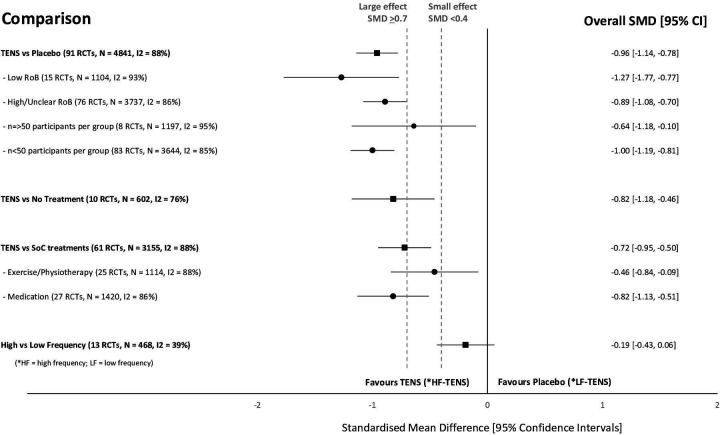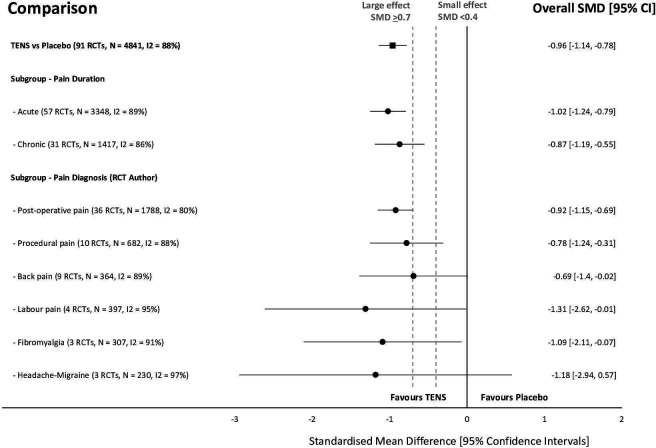I know, transcutaneous electrical nerve stimulation (TENS) is not really a so-called alternative medicine (SCAM) but it is used by many SCAM practitioners and pain patients. It is, therefore, worth knowing whether it works.
This systematic review investigated the efficacy and safety of transcutaneous electrical nerve stimulation (TENS) for the relief of pain in adults. All randomized clinical trials (RCTs) were considered which compared strong non-painful TENS at or close to the site of pain versus placebo or other treatments in adults with pain, irrespective of diagnosis.
Reviewers independently screened, extracted data, and assessed the risk of bias (RoB, Cochrane tool) and certainty of evidence (Grading and Recommendations, Assessment, Development, and Evaluation). The outcome measures were the mean pain intensity and the proportions of participants achieving reductions of pain intensity (≥30% or >50%) during or immediately after TENS. Random effect models were used to calculate standardized mean differences (SMD) and risk ratios. Subgroup analyses were related to trial methodology and characteristics of pain.
The review included 381 RCTs (24 532 participants). Pain intensity was lower during or immediately after TENS compared with placebo (91 RCTs, 92 samples, n=4841, SMD=-0·96 (95% CI -1·14 to -0·78), moderate-certainty evidence). Methodological (eg, RoB, sample size) and pain characteristics (eg, acute vs chronic, diagnosis) did not modify the effect. Pain intensity was lower during or immediately after TENS compared with pharmacological and non-pharmacological treatments used as part of standard of care (61 RCTs, 61 samples, n=3155, SMD = -0·72 (95% CI -0·95 to -0·50], low-certainty evidence). Levels of evidence were downgraded because of small-sized trials contributing to imprecision in magnitude estimates. Data were limited for other outcomes including adverse events which were poorly reported, generally mild, and not different from comparators.
The authors concluded that there was moderate-certainty evidence that pain intensity is lower during or immediately after TENS compared with placebo and without serious adverse events.
This is an impressive review, not least because of its rigorous methodology and the large number of included trials. Its results are clear and convincing. In the words of the authors: “TENS should be considered in a similar manner to rubbing, cooling or warming the skin to provide symptomatic relief of pain via neuromodulation. One advantage of TENS is that users can adjust electrical characteristics to produce a wide variety of TENS sensations such as pulsate and paraesthesiae to combat the dynamic nature of pain. Consequently, patients need to learn how to use a systematic process of trial and error to select electrode positions and electrical characteristics to optimise benefits and minimise problems on a moment to moment basis.”



Well, that’s one way to bump up the n
“We included TENS administered by a therapist and/or participant; as a sole treatment or in combination with other treatments, for any duration or regularity of treatment; as a single or multiple treatment intervention with or without follow-up. However, we only extracted data for the measurement timepoint during or immediately after a TENS treatment, as this is the most ecologically valid outcome.”.”
“Thus, comparisons were either TENS compared head-to-head with a SoC intervention (ie, TENS vs SoC) or TENS as an adjunct to a SoC intervention (ie, TENS combined with SoC vs SoC alone).”
Interesting
“If TENS was administered as a course of treatments, we extracted data from the last treatment session.”
When they say “TENS” weren’t they really referring to the ancient treatment modality “Electrico Acupuncture” ?
no!
Scenar will reduce the pain and start the healing process. TENS just does pain reduction. Done too long it can actually be harmful and the body will start to ignore the signal.
SCENAR, effective for a very broad range of diseases or merely a means for quacks to exploit the public?
https://edzardernst.com/2019/03/scenar-effective-for-a-very-broad-range-of-diseases-or-merely-a-means-for-quacks-to-exploit-the-public/
Rogerstan,How much is Scenar paying you to promote their device? How do I get my beak wet? I will promote the hell out of it and make some sweet sweet dough. Tell me, who do I contact at Scenar?
Buy a used device like I did originally and try it out. Then when you see results you can discuss the subject fruitfully without displaying your ignorance. There is no “Scenar” company and no manufacturers that I know of making sweet dough. Sorry to disappoint.
Of course, anyone who hasn’t used a remedy is ignorant of said remedy and is unworthy to discuss such matters. A surgeon who hasn’t operated on themselves is truly ignorant of those surgery techniques they are supposed to master and should not even be discussing them let alone perform them on other people.
Certainly, you must have seen financial records of all those companies that manufacture Scenar devices. How else would you know they are not making sweet dough? Maybe you have friends at those companies that provide that information?
Why would anyone promote something unless they are getting paid? Doctors get paid by big pharm to push drugs. Hospitals get paid by big pharma, big medical device manufacturers etc. to push their products on unsuspecting patients. Why should it be different in your case when you promote scenar over TENS devices?
Anyway, I thought I could make some quick buck by promoting scanar devices and approached you for advice. But, you turned out to be a disappointment, stan!
This report and the comments leave me wanting to know more about the TENS treatment and the study. How is this different from “electrico acupuncture”? “no” isn’t really an answer–please elaborate.
The study, to the eye of a non-medical, informed, but not trained reader, seems to have very narrow parameters–but I could be wrong of course.
I ask because I have heard numerous testimonials of this treatment that go far beyond pain control and it is not covered by all insurance (which is usually because it is not deemed medically effective)–nevermind that chiro and acupunture ARE covered). As I am always highly skeptical of testimonials and anecdotes, I was eager to read this, but come away with more questions than answers.
Can someone direct me to a more thorough discussion?
there are hundreds of sites on tens; even a wiki: https://en.wikipedia.org/wiki/Transcutaneous_electrical_nerve_stimulation
She who watches,
TENS is rather different from electro-acupunture. Acupuncture of all kinds is based on the belief that disease is caused by blockage of the flow of something known as Chi, sometimes translated into English as energy or vital force, through channels in the body known as meridians. By placing needles into specific points along the meridians the blockages are resolved. Or something along those lines. Nobody has been able to provide evidence that these meridians exist, or Chi for that matter (although a standard greeting in Japanese is “O-genki desu-ka?”, literally “Is your Chi good?” or more loosely “How are you?”).
TENS, on the other hand, works on the same principle as rubbing your knee after you have accidentally banged it, or spraying Deep Heat onto a sprained muscle. Essentially this follows the gate theory of pain, first proposed by Ronald Melzack and Patrick Wall (whom I once met) in 1965. The peripheral sensory neurons, carrying information from the skin and elsewhere, connect to afferent neurons in the spinal cord, which relay the signals to the brain. Different peripheral neurons connect to the same afferent neurons and the synapses where they connect can act as a kind of gate, only letting some of the signals through. By stimulating sensory nerves coming from the skin, the pain signals are inhibited, so the perception of pain is reduced. TENS is a way of providing that sensory stimulation using a small electric current.